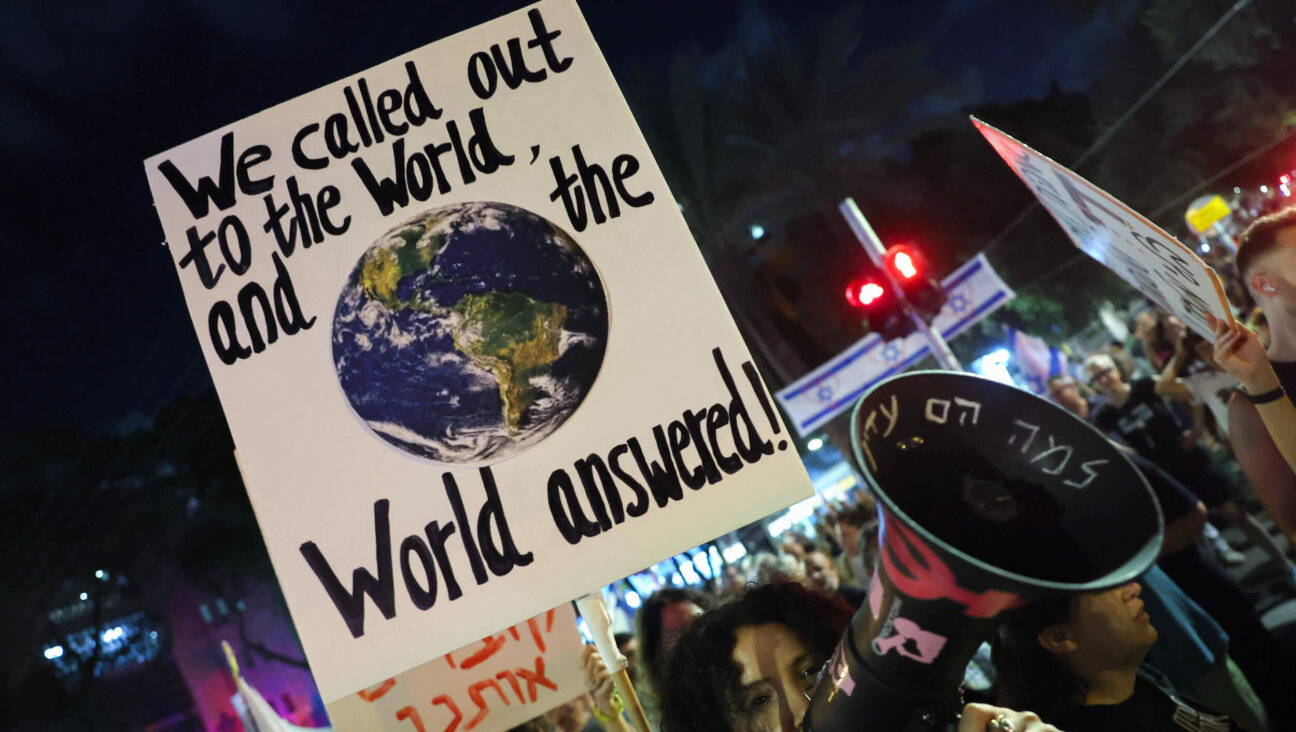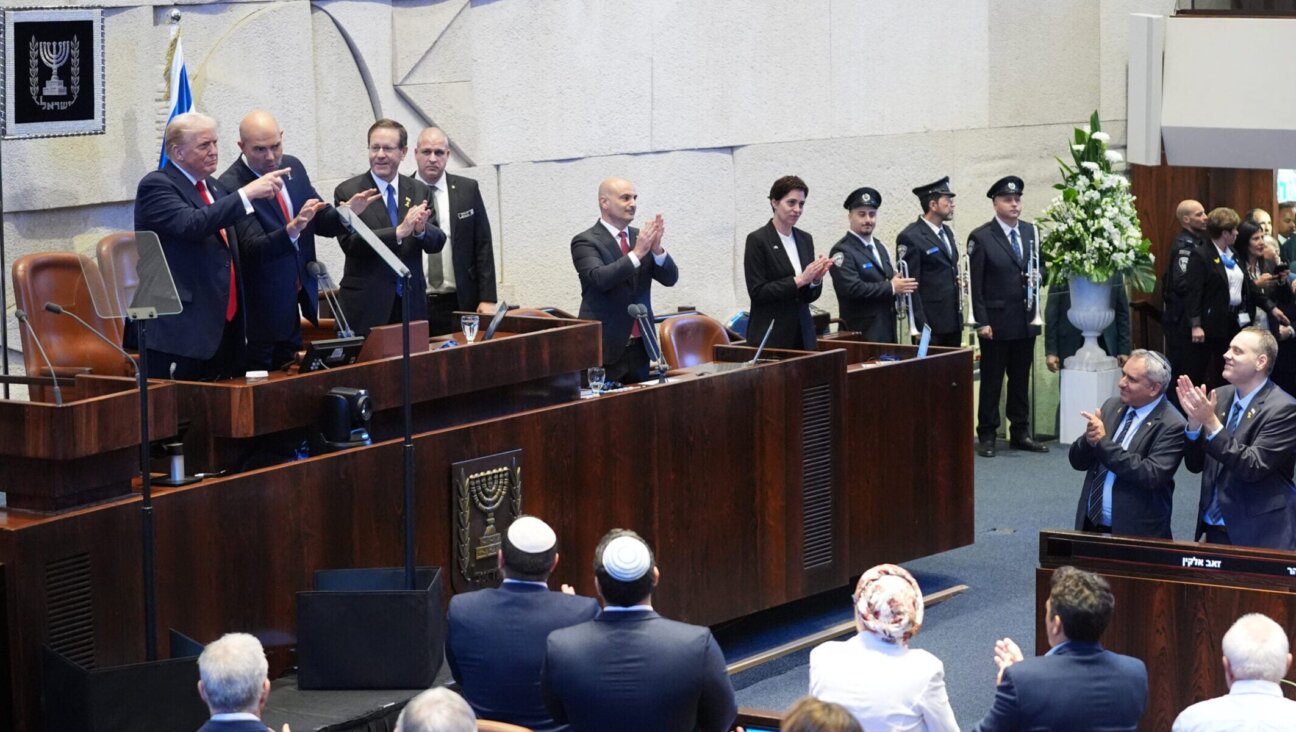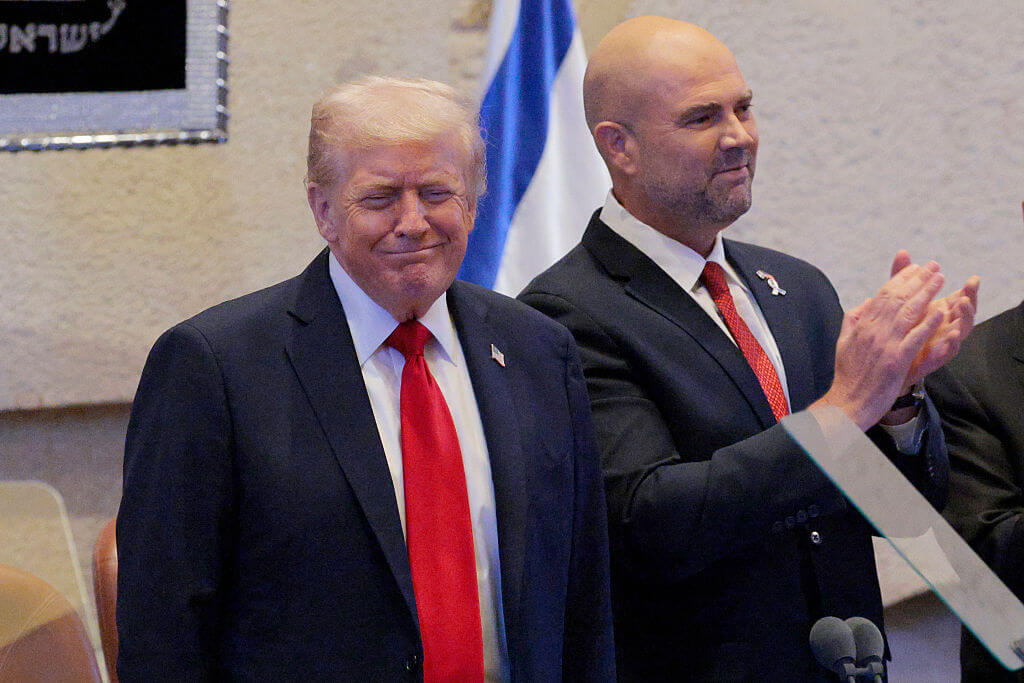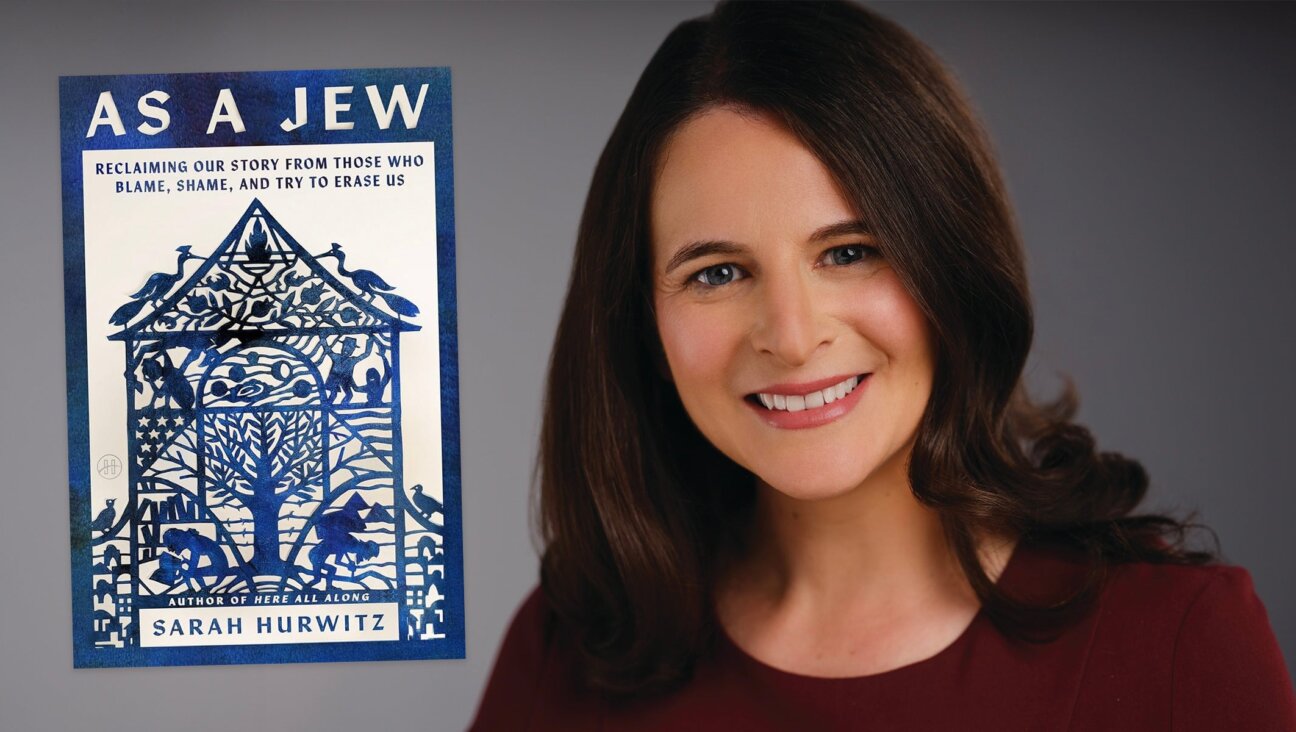Time for an Arabic ‘Hatikva’?
Sign up for Forwarding the News, our essential morning briefing with trusted, nonpartisan news and analysis, curated by senior writer Benyamin Cohen.
It’s no secret that many of Israel’s Arab citizens do not particularly embrace Israel’s national anthem, “Hatikva,” what with its talk of the “Jewish soul” yearning for Zion for 2,000 years.
Last year, Israel’s first Arab Cabinet minister, Raleb Majadele, caused quite a stir when he explained why he refuses to sing “Hatikva.” “I fail to understand how an enlightened, sane Jew allows himself to ask a Muslim person with a different language and culture, to sing an anthem that was written for Jews only,” he said.
Some Israeli right-wingers react to Arab citizens’ alienation from the anthem with rage and cries of disloyalty. On the left, meanwhile, there are those who respond with proposals to modify the anthem’s lyrics, stripping away some of its Jewish specificity so that Israel’s non-Jewish citizens could better identify with it. (Though it’s hard to see how this approach, pursued to its logical conclusion, would leave any of the current lyrics intact.)
Writing in Ha’aretz, Canadian-Israeli lawyer Gadi BenMark proposes an interesting third way.
BenMark opposes changing “Hatikva” (“The words carry deep meaning, boast a rich history and stir emotion,” he writes), and yet he also recognizes that Arab citizens can hardly be expected to sing with pride a song that is focused solely on Jewish identity.
And so BenMark offers up Canada as a model for addressing this issue. Its national anthem, “O Canada,” has two sets of official lyrics — one in French and one in English. The Canadian anthem’s French lyrics refer specifically to the experience of the Quebecois, and speak to their Catholic heritage, while the English version is more universalistic. Why, he asks, can’t Israel have a separate set of anthem lyrics for Arabic speakers?
He writes:
“Hatikva” is ingrained and entrenched and it makes no sense to translate those words into Arabic. But just as all Canadians share the music of “O Canada,” all Israelis can share the music of “Hatikva.” The music is the bridge that unites.
The original version, with Hebrew lyrics, remains unaltered.
For the Arabic lyrics, Israel can commission a contest among Arabic speakers and poets. The mission would be to put together text to which any Israeli citizen who speaks Arabic can relate. This is a tall order. On one hand, “Hatikva’s” music, in a minor key, lends itself to lyrics in Arabic, and these lyrics can express hope. It can be called “Al Amal,” the hope, thus carrying the same meaning as “Hatikva,” yet this hope needs to be “universal Israeli.” If “Al Amal” is to throw all the Jews into the sea, it is unlikely to resonate well with Arabic-speaking Jews. It needs to be an anthem of hope, an anthem that any Israeli citizen can sing in Arabic, whether they are Jewish, Christian or Muslim, for as long as they can sing — and best of all if they just received an Olympic gold medal.
BenMark’s idea is a very promising one, and it is vastly preferable to the post-Zionist and the extreme-rightist alternatives (as well as to the head-in-the-sand response of many of those in the muddled middle when it comes to this issue).
Still, I think he doesn’t go quite far enough in one key respect, which reflects a common — and larger — shortcoming in conventional thinking about issues of Israel’s national identity, specifically as it relates to the country’s Arab minority.
BenMark specifies that the Arabic anthem lyrics must be “universal Israeli.” He insists they should be a “text to which any Israeli citizen who speaks Arabic can relate.” He says that the Arabic anthem should be one “that any Israeli citizen can sing in Arabic, whether they are Jewish, Christian or Muslim.”
This is a tall order. But is it fair?
“Hatikva,” after all, would not meet an equivalent test (as BenMark would seem to readily admit). “Hatikva” speaks specifically to the Jewish experience and relationship to the Land of Israel. Why can’t the Arabic version speak specifically to Arab identity and Arab ties to the land? If the Hebrew lyrics can speak to Jewish particularity (and thus exclude Arabs), why must the Arabic lyrics be inclusive toward Jewish Arabic-speakers?
That’s not to suggest that it would be acceptable for the Arabic lyrics to advocate throwing the Jews into the sea, as BenMark puts it. Rather, they could speak to Arab pride without expressing hostility to the Jewish national project. (“Hatikva,” after all, is in no way hostile to Arabs; it simply isn’t about them.)
While BenMark’s proposal is certainly valuable — and in many respects visionary — it seems to fall short when it comes to recognizing Israel’s Arab citizens as a national minority with a distinct collective identity.
Israel’s Arab citizens have deep roots (and corresponding rights) in the land. That’s why they deserve symbols that speak specifically to their experience, just as Israeli Jews have such symbols for themselves. Israeli Jews treasure their national self-determination; Israel’s Arab citizens want a measure of the same thing.
Mainstream Israeli political thinkers — including many on the center-left — have often reacted with alarm to the recent calls by Israel’s Arab citizens for autonomy, fearing that these demands represent a threat to the Jewish character of the state. In part, of course, this is because demands from Israel’s Arab citizens for autonomy sometimes seem to be coupled with calls for jettisoning the state’s Jewish attributes. But there is also a widespread fear of the concept of autonomy for Israel’s Arab minority in and of itself.
The idea of autonomy for Israel’s Arab minority, however, does not inherently threaten the state’s Jewish attributes. Indeed, it could actually help to preserve them.
The post-Zionist response to the dilemma of Israel’s Arab citizens is as follows: Invent a de-Judaized (and thus de-historicized) Israeli national identity that encompasses both Arabs and Jews. Alter the anthem, change the flag, maybe lose the “Law of Return,” perhaps ditch the state seal and so on. Voila! Everyone’s happy.
The problem is that most Israeli Jews would not be happy with such an outcome. And it’s not entirely clear that most of the state’s Arab citizens would be satisfied either.
What both groups do desire, it seems, is the right to express — and have recognized — their own unique (and ultimately incompatible) national narratives. So why not create space for both groups to express their identities side by side, in civility, without requiring either to adulterate theirs to accommodate the other’s?
If Israel has a flag, seal and anthem that speak to Jewish history, why not allow Israel’s Arab minority to have its own symbols and standards that speak to Arab identity? If Jewish schools teach Jewish history, why not grant the Arab sector autonomy over its own educational curricula?
Sure, working out the contours of Arab autonomy would be a challenge, and this approach does come with its own attendant dangers. But it may be the best way of heading off calls for stripping Israel of its Jewish attributes. And it does so by offering a Zionist-friendly response to the post-Zionist challenge.
P.S. I should add, I am not Israeli, nor am I a Zionist. (As an American Jew, I identify as a pro-Zionist non-Zionist, to make a distinction — a la the 1956 Blaustein-Ben Gurion agreement — that has become, unfortunately, a bit anachronistic.) Therefore, I offer my suggestions in a spirit of concern for my fellow Jews and, above all, of humility. These are ultimately decisions that will have to be made, not by backseat drivers in America, but by our brothers and sisters in Israel, in consultation with their Arab fellow citizens.
















